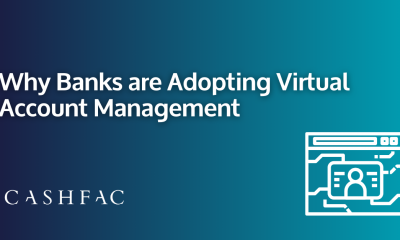The Change in the Technology Paradigm – Are Fintechs Really ‘All That’?
FourthLine's Specialist Regulatory & CASS Consultant – Jo Parkhill – offers her reflections on the change in the technology paradigm and the impact of fintechs.
Discussions around the burgeoning fintech industry and technology interventions that are almost synonymous with the financial services industry, tend to provoke in me a precautionary ‘note to self’ of the ‘buyers beware’ principle. Not all fintechs nor technology solutions for that matter, are created equally. This has not prevented a plethora of fintechs jumping on what is a very lucrative ‘gravy train’ while being relatively (if not completely) agnostic of the cumbersome regulatory landscape, not to mention the reality of the manifold operational complexities and constraints many financial organisations have to navigate daily.
This is by no means to say that I view fintechs or technology advancements in a negative light. Undoubtedly, the fintech/technology revolution of recent years has brought many benefits to the financial services industry. This includes the creation of greater efficiencies, improved time to market, real-time processing and reconciliations and a reduction in risk through the automation of many processes with less reliance on manual controls in the form of glorified excel spreadsheets.
Nevertheless, experience does tell me to tread cautiously where sectors grow exponentially without appropriate control or regulation: ‘all that glitters is not gold’. While fintechs may have brought numerous benefits to the financial services industry over the last number of years, there are inherent costs and risks of placing such heavy reliance on fintechs and technology per se. The question is whether these risks and costs are proportionate or even justifiable when just opposed against the industry’s end goal of creating efficiencies whilst continuing to operate in a way that is compliant with the regulatory landscape to which they are subject and enable them to act in a way that is consistently in the best interests of clients.
Do fintechs and technology solutions actually enable organisations to do more with less? Potentially not. Solutions implemented are often irreconcilable with an organisation’s operational model requiring the solution to be re-engineered often more than once which is a costly endeavour. This is not to mention the time and effort spent investigating technology ‘glitches’ or understanding the system/information flow with solutions being implemented in isolation with little or no interconnectivity with embedded systems and processes.
How scalable are the solutions being provided? In an ever-changing regulatory environment that places huge pressure on financial organisations, scalability is crucial: the ability to adapt systems and processes to meet new and growing regulatory and market demands. Arguably, the solutions being implemented by some fintechs are at best short-sighted; at worse; piecemeal ‘one-hit wonders’ that create just as much fragmentation and disarray as existing legacy solutions.
At a time when the industry should be eliminating silos in favour of front-to-end holistic processes and solutions, there is a risk that fintechs and technology intervention/interruption creates a new breed of silo all of their own: solutions that are implemented in isolation and which are misaligned and irreconcilable with organisation’s operational reality and existing processes and controls.
Of greater concern perhaps is what could be perceived as the effective ‘dumbing down’ of an entire workforce with individuals being relegated to ‘button pusher’ status with little or no impetus to question or indeed challenge the whys or wherefores of the functions they perform on a day-to-day basis with too much reliance being placed on technology to be ‘the brain’ and to do the leg work.
At a time when there is a significant focus on culture, responsibility and accountability particularly with the ever-increasing remit of the Senior Managers and Certification Regime (SMCR), are these principles being somewhat undermined with fintech/technology intervention/interruption with Managers being perhaps tempted to wash their hands clean by blaming indiscretions on the technology build?
With over 25 years in the industry, Cashfac has grown organically from deep-seated roots in the banking sector, providing solutions that are holistic in nature; that require them to really know the organisation for whom they are solutionising and which leverages not only technology but also financial and regulatory expertise to provide solutions that are effective and scalable and which allow the organisation to retain its independence and autonomy.
If you are an organisation who is considering the fintech route, I would recommend that in the first instance you defer to the ‘buyer beware’ principles to ensure that whatever fintech you choose is not a one-stop-shop for all in sundry; that it has real financial and operational know-how and expertise and most importantly, is the right fit for your organisation and can fully meet your needs in a holistic way that is consistent with your front-to-end business model and enables you to act in a way that is in the best interests of your clients.
View the webinar
About the Author
Graduating in Law from Trinity College Dublin, Jo has 18 years experience working within top-tier Global Financial Institutions within Investment Banking, Investment Management and Asset Management, and across Front Office, Compliance, Risk Management and Operations.
Since 2009, Jo has facilitated the implementation of many regulatory change programmes: Lehman Supreme Court Ruling, FSA Disclosure Annex, CASS RP; PS 14/9; MiFID II CASS impact; FRC Assurance Standard; CASS Audits) as well as conducting major CASS remediation programmes of work. Jo is currently a CASS and regulatory specialist consultant to a top-tier French Investment Bank and Cashfac. She is also external CF10a to a leading Peer-to-Peer organisation.
In recent years, Jo has been the CF10a & UK Head of Transfer Agency for UBS AM and led an in-depth Transformation programme at Emirates NBD. Jo has also managed Prime Brokerage Client OnBoarding and has facilitated regulatory change programmes of work around EMIR, Dodd Frank, legal Entity Identification, MiFID I & II; PSD I & II, and GDPR.
A wealth of experience and expertise, Jo focuses on eliminating silos in favour of holistic solutions that combine commercialism, pragmatism, interconnectivity and regulatory knowledge. Jo facilitates solutions that are strategic and scalable in nature, focussing on root causes, as opposed to quick fix tactical solutions that quickly become unfit for purpose.


